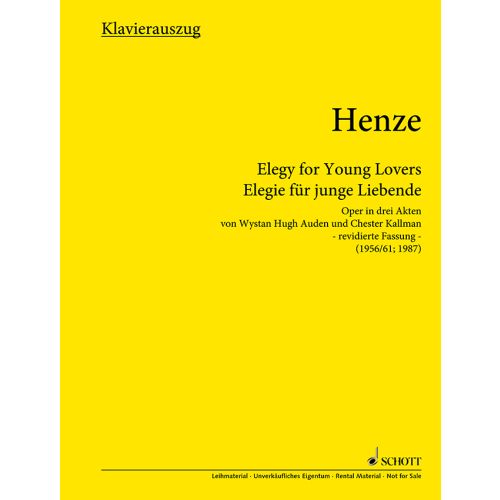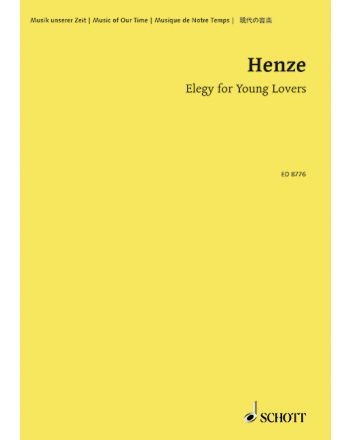Lieferzeit
2-3 Tage
Elegy for Young Lovers – Elegie für junge Liebende
Oper in drei Akten von Wystan Hugh Auden und Chester Kallman
Deutsche Fassung von Ludwig Landgraf unter Mitarbeit von Werner Schachteli und dem Komponisten
Edition: Matériel d'exécution
Série:
Elegie für junge Liebende
Détails du produit
Description
The poet Mittenhofer has assembled his circle of loyal companions at a mountain inn in the Alps: his patron and secretary countess Carolina, his personal physician Dr. Reischmann, his lover Elisabeth and, above all, Hilda Mack who has been waiting for forty years for the return of her fiancé who disappeared in the mountains. Their visions and hallucinations nourish Mittenhofer’s artistic inspiration. The arrival of Dr. Reischmann’s son Toni disturbs the fragile balance of the reciprocal dependencies: Toni falls in love with Elisabeth, observed with increasing jealousy by Mittenhofer. Simultaneously, Hilda’s fiancé is discovered, her visions have evaporated and she wants to break out of the enforced community. Toni and Elisabeth also wish to leave the hotel. Mittenhofer asks for a final favour: they should bring him an edelweiss from the mountains. Mittenhofer and the countess omit to inform the mountain guide who is concerned about an approaching snow storm that Toni and Elisabeth are on the mountain face, despite being aware that their life is in danger. This catastrophe provides new inspiration for Mittenhofer. At a literary event in celebration of his 60th birthday, he recites his latest poem – The Elegy for Young Lovers, dedicated to Toni und Elisabeth – to his audience who hang on his words with bated breath The Elegy for Young Lovers is Henze’s first opera in collaboration with the authors Auden and Kallman. The most incisive stylistic facets of the music are on the one hand the vocal parts ranging from parlando and arioso sections to a variety of ensemble pieces and on the other hand the dramatic stringency of assigning specific instruments to the individual characters. This provides a commentary to the actions on stage and the psychological entanglements as a form of audible magnification.
"What we experience is essentially the birth of a poem: the poem evolving during the course of the three acts which we are able to observe right from its moment of conception up to the culminating first public reading. The grotesque, ridiculous, vulgar, iniquitous and cruel accompaniments to this birth process are all levelled against the figure of the artist as a hero: the concept of a heroic life which was never really relinquished by the 19th century. – One factor of this concept is the catastrophic vision of the artist living in isolation for the good of his creativity: his enforced existence as an outcast, outsider and pariah, as someone forced to suspend his own self and live according to other existing principles than are applied to normal persons. The harrowing essence of this concept is revealed to us in the culminating scene of the opera. The central figure of the work is the fêted poet Gregor Mittenhofer who could have been the model for a number of prototypes within the literary world around the turn of the twentieth century. His destiny is his obsession with his work, his inability to communicate and his alienation from his environment. Mittenhofer is like a Moloch who is prepared to sacrifice everything for his creative work. In his own fascination, he appears as a medicine man and his mania and demons can be viewed as a part of his mythical form."
"What we experience is essentially the birth of a poem: the poem evolving during the course of the three acts which we are able to observe right from its moment of conception up to the culminating first public reading. The grotesque, ridiculous, vulgar, iniquitous and cruel accompaniments to this birth process are all levelled against the figure of the artist as a hero: the concept of a heroic life which was never really relinquished by the 19th century. – One factor of this concept is the catastrophic vision of the artist living in isolation for the good of his creativity: his enforced existence as an outcast, outsider and pariah, as someone forced to suspend his own self and live according to other existing principles than are applied to normal persons. The harrowing essence of this concept is revealed to us in the culminating scene of the opera. The central figure of the work is the fêted poet Gregor Mittenhofer who could have been the model for a number of prototypes within the literary world around the turn of the twentieth century. His destiny is his obsession with his work, his inability to communicate and his alienation from his environment. Mittenhofer is like a Moloch who is prepared to sacrifice everything for his creative work. In his own fascination, he appears as a medicine man and his mania and demons can be viewed as a part of his mythical form."
Orchestral Cast
1 (auch Picc., Altfl. u. Altblfl. ad lib.) · 1 (auch Engl. Hr.) · 1 (auch Bassklar.) · Altsax. · 1 - 1 · 1 (auch Trp. in D) · 1 · 0 - P. S. (Glsp. · Marimba · Vibr. · 3 Trgl. · 6 Röhrengl. · 3 Fingerzimb. · 3 Kuhgl. · 3 hg. Beck. · Beckenpaar · 3 Tamt. · 3 Tomt. · 3 Schellentr. · 3 Bong. · 2 Mil. Tr. [m. u. o. Schnarrs.] · 2 gr. Tr. · Mar. · Woodbl. · Metallbl. · Flex. [od. elektr. Instr.]) (6 Spieler) - Git. · Mand. · Hfe · Cel. · Klav. (ohne Abdeckung) - Str. (chorisch oder solistisch: 2 · 0 · 1 · 1 · 1)
Programmation des personnes
Gregor Mittenhofer, ein Dichter · Bariton - Elisabeth Zimmer · Sopran - Hilde Mack, eine Witwe · Koloratursopran - Carolina Gräfin von Kirchstätten, Sekretärin von Mittenhofer · Alt - Toni Reischmann · lyrischer Tenor - Dr. Wilhelm Reischmann, ein Arzt · Bass - Josef Mauer, ein Bergführer · Sprechrolle - Bedienstete im "Schwarzen Adler" · stumme Rollen
Plus d'infos
Titre:
Elegy for Young Lovers – Elegie für junge Liebende
Oper in drei Akten von Wystan Hugh Auden und Chester Kallman
Deutsche Fassung von Ludwig Landgraf unter Mitarbeit von Werner Schachteli und dem Komponisten
Italienische Textfassung von Flavio Testi
Langue:
Allemand, Anglais, Italien
Edition:
Matériel d'exécution
Maison d'édition:
Schott Music
Year of composition:
1959 - 1961 (1987)
Durée:
150 ′0 ′′
Première:
20 mai 1961 · Schwetzingen (D)
Schwetzinger Festspiele 1961
Musikalische Leitung: Heinrich Bender · Orchester der Bayerischen Staatsoper
Inszenierung: Hans Werner Henze · Kostüme: Sophie Schröck · Bühnenbild: Helmut Jürgens
(scenic)
28 octobre 1988 · Venezia (I)
Teatro La Fenice
Musikalische Leitung: Markus Stenz · Orchestra del Teatro La Fenice
Première mondiale (révision) (semi-staged world première of the revised version)
Schwetzinger Festspiele 1961
Musikalische Leitung: Heinrich Bender · Orchester der Bayerischen Staatsoper
Inszenierung: Hans Werner Henze · Kostüme: Sophie Schröck · Bühnenbild: Helmut Jürgens
(scenic)
28 octobre 1988 · Venezia (I)
Teatro La Fenice
Musikalische Leitung: Markus Stenz · Orchestra del Teatro La Fenice
Première mondiale (révision) (semi-staged world première of the revised version)
Travaux commandés :
Auftragswerk des Süddeutschen Rundfunks Stuttgart
Série:
Mots clés:
Détails techniques
Type de support:
Matériel en location / d'exécution
Numéro du produit:
LS 2087-01
Fabricant:
Preview/Media Contents
Audio:
Personnes
Plus de cette série
Elegie für junge Liebende
représentations
Elegy for Young Lovers – Elegie für junge Liebende
Chef d'orchestre: Gernot Sahler
30 janvier 2024 |
Salzburg (L'Autriche) , Mozarteum, Max Schlereth Saal
Elegy for Young Lovers – Elegie für junge Liebende
Chef d'orchestre: Gernot Sahler
29 janvier 2024 |
Salzburg (L'Autriche) , Mozarteum, Max Schlereth Saal
Elegy for Young Lovers – Elegie für junge Liebende
Chef d'orchestre: Gernot Sahler
27 janvier 2024 |
Salzburg (L'Autriche) , Mozarteum, Max Schlereth Saal
Elegy for Young Lovers – Elegie für junge Liebende
Chef d'orchestre: Gernot Sahler
26 janvier 2024 |
Salzburg (L'Autriche) , Mozarteum, Max Schlereth Saal — Première soirée
Elegy for Young Lovers – Elegie für junge Liebende
Chef d'orchestre: Bernhard Epstein
Orchestre: Kammerenesemble der Staatlichen Hochschule für Musik und Darstellende Kunst Stuttgart
16 juin 2019 |
Stuttgart (Allemagne) , Wilhelma-Theater
Commentaires
Seul(e)s les utilisateurs/-trices enregistré(e)s peuvent écrire des commentaires. S’il vous plaît, connectez-vous ou créez un compte.



